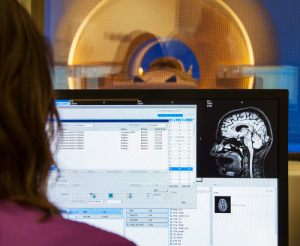by
Thomas Dworetzky, Contributing Reporter | December 07, 2018
MR scans could soon be done 10 times faster, thanks to a a large-scale MR dataset just released to the public from fastMRI, a collaboration between Facebook AI Research and NYU Langone's Department of Radiology.
“We hope that the release of this landmark data set, the largest-ever collection of fully-sampled MR raw data, will provide researchers with the tools necessary to overcome the challenges inherent in accelerating MR imaging,” Dr. Michael P. Recht, chair and the Louis Marx Professor of Radiology at NYU Langone said in a statement following his announcement of the news in a plenary address at the 2018 annual meeting of the Radiological Society of North America (RSNA).
Recht also shared baseline results from the collaboration, made up of 1.5 million MR images of the knee from 10,000 scans, plus raw measurement data from almost 1,600 scans. The collaboration demonstrates that acceleration of MR imaging by a factor of four “is already possible".



Ad Statistics
Times Displayed: 45507
Times Visited: 1360 MIT labs, experts in Multi-Vendor component level repair of: MRI Coils, RF amplifiers, Gradient Amplifiers Contrast Media Injectors. System repairs, sub-assembly repairs, component level repairs, refurbish/calibrate. info@mitlabsusa.com/+1 (305) 470-8013
The data set is fully anonymized, HIPAA-compliant information from NYU's medical school – and no Facebook data. Future releases will add data from liver and brain scans.
In addition, the open source tool is expected to boost the development of AI systems that are capable of deciphering MR scans, boost research reproducibility, and open the door for more consistent evaluation methods. Plans call for the collaboration to develop a suite of tools and baseline metrics to compare results in an organized challenge that will be announced “in the near future,” according to the NYU report.
“This collaboration focuses on applying the strengths of machine learning to reconstruct high-value images in new ways. Rather than using existing images to train AI algorithms, we will radically change the way medical images are acquired in the first place,” Dr. Daniel K. Sodickson, director of NYU's Center for Advanced Imaging Innovation and Research, added in a statement. “Our aim is not merely to enhance data mining with AI, but rather create new capabilities for medical visualization, to benefit human health.”
MR scans can generate a huge amount of valuable information but are slow in nature. By applying AI to exams, researchers believe they can cut down on the amount of data captured, while maintaining and even boosting the richness of the information in images.
Such features are expected to benefit patients who cannot tolerate the typical length of the process, including very young children, elderly adults and those who are claustrophobic. It may also reduce the need for drug administration to calm jittery patients.

